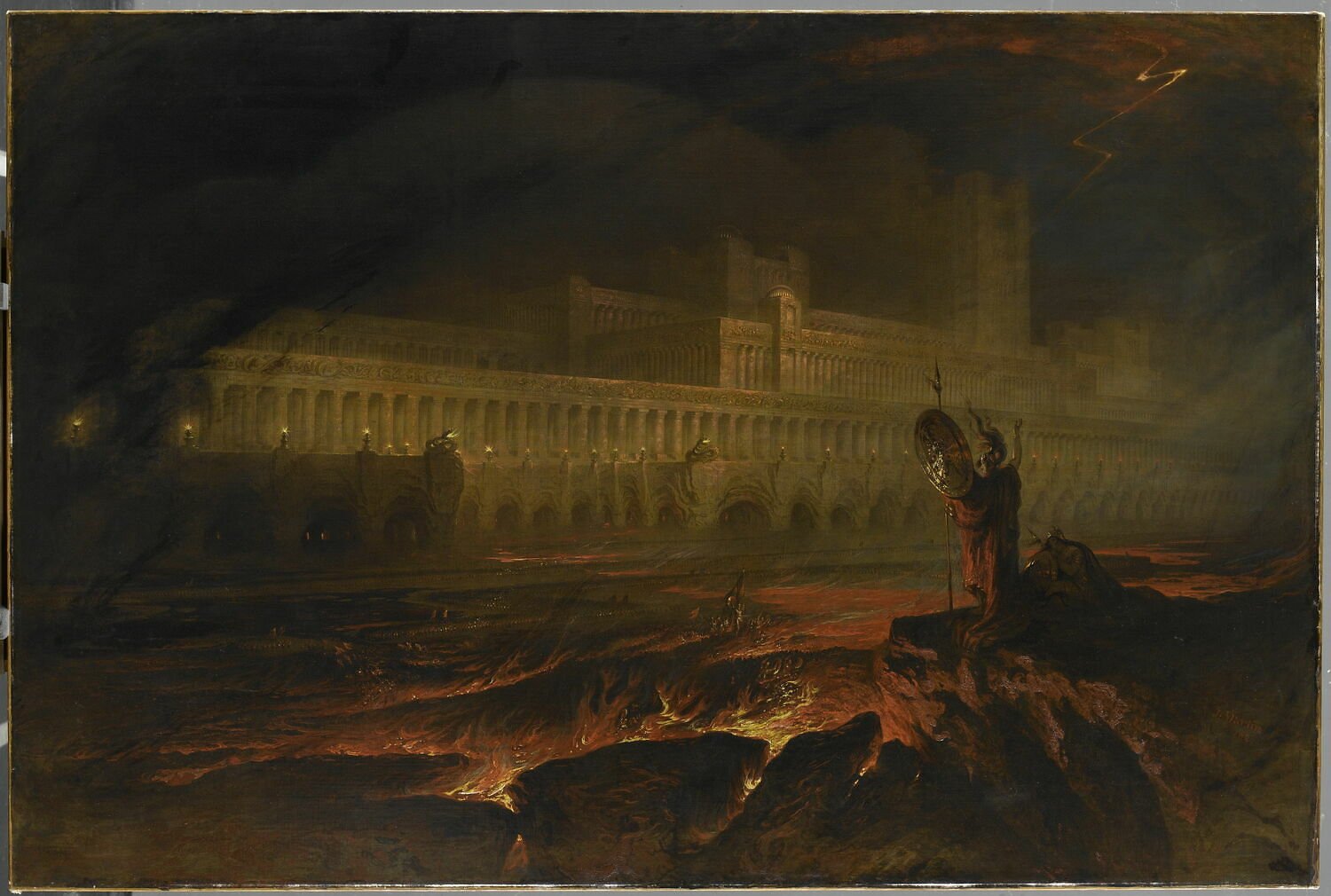24 January 2022
In present-day usage, pandemonium is a place of confusion and chaos. But the word was coined by John Milton in his 1667 Paradise Lost, and he used the word as the name of the capital of hell. Milton combined the prefix pan- (whole of, universality), from the Greek παν-, with the Latin daemonium, demon or spirit. Therefore, pandemonium is literally the place of all demons. The use of pan- as a combining form in English was rare before the nineteenth century, so Milton’s use was unusual and distinctive, but not unprecedented. From Paradise Lost 1.175–57:
Mean while the winged Haralds by command
Of Sovran power, with awful Ceremony
And Trumpets sound throughout the Host proclaim
A solemn Councel forthwith to be held
At Pandæmonium, the high Capitol
Of Satan and his Peers
Milton used pandemonium to refer to a specific palace or citadel within hell, but by the next century the word was being used as a synonym for hell itself. From the Earl of Chesterfield’s “Old England” of 1743:
“This Jeffrey Broadbottom, this constitutional journal, is certainly levelled at us,” says a conscious sullen apostate to his fallen brethren in the Pandæmonium.
And around the same time, pandemonium starts being used with an extended meaning of a place of evil or iniquity. There is this 1755 anonymous piece, titled M—Ckl—n’s Answer to Tully that refers to a theater audience as a pandemonium, but it is an extended use of Milton’s term, the following passage is preceded by a quotation from Paradise Lost and ends with a reference to the poem:
But as I observed before, Envy must always—always detract from that Joy which otherways would be too much to bear, when arising from the Applause of the Learned and the Great. I complained of this Usage, but a Gentleman observed that as I had at the Beginning call’d myself the Grand Devil and waggishly term’d the Audience my Pandæmonium, a Hiss was the most proper Token of Applause; as Milton himself assures us, when the Devil had finish’d, the others signified their Applause by a Hiss.
In 1779, Henry Swinburne uses pandemonium in a travel narrative without any explicit reference to Milton to describe the country of Spain:
Were I to draw the picture of the Spaniards from the manyfold sketches traced by their countrymen, every province in the kingdom would in its turn appear a Paradise, and a Pandæmonium, a seat of holy spirts, and a receptacle of malicious devils; the most contradictory accounts, enforced by the most positive asseverations, have been repeatedly given me of the same places.
And in the nineteenth century we see the sense of pandemonium meaning confusion or chaos. This passage, from Robert Montgomery’s 1827 satire The Age Reviewed, describes men competing for the affections of young women, while their teams and coaches, awaiting them outside, are in a chaotic traffic jam:
Now from the Op’ra’s widened portals stream
A shiv’ring concourse,—wide the torches gleam,—
And fling cadav’rous hues upon each face,
Where palled Delight has left her pale-worn trace;
Perturbed mark, the blinking chap’rons guard,
Wrapt in her gather’d silks—their dainty ward;
While flutt’ring near, gallants obtrusive try
To read the twinkling promise of her eye:
Within the crush-room fretful throngs parade,
And lisping puppies quizz each well-laced maid;
Some round the fire-place chafe their chilly hands,
Smooth their wild locks, and fold their silken bands:
Here, too, the rival flirt with whispers loud,
Hung on a suitor’s arm, attracts the crowd;
While borne with crutches to the creaking door,
The snarling cuckolds for their cars implore:
Without,—a Pandemonium seems to sound,
Where busy foot-falls beat along the ground;
The bouncing coachman’s sky-ascending bawl,
And loud-mouthed lacquies elbowing through all,—
The cracking stones beneath each fire-eyed steed,
All eager pawing till the course is freed,
Commingled—greet the concourse hastening home,
To dream of neat-legg’d eunuchs fresh from Rome!
One can find sources that claim that pandemonium derives from the Greek god Pan, but that is not the case.
Sources:
Chesterfield, Earl of (Philip Dormer Stanhope). “Old England, Or the Constitutional Journal” (19 February 1743). Miscellaneous Works, vol. 1 of 2. London: Edward and Charles Dilly, 1777, 116. Eighteenth Century Collections Online (ECCO).
Dictionary of Medieval Latin from British Sources, Oxford: Oxford UP, 2013, s.v. daemonium. Brepols: Database of Latin Dictionaries.
Lewis, Charlton T. and Charles Short. A Latin Dictionary. Oxford: Oxford UP, 1879, s.v. daemonium, n. Brepols: Database of Latin Dictionaries.
M—Ckl—n’s Answer to Tully. London: S. Stonehouse, 1755, 8–9. Eighteenth Century Collections Online (ECCO).
Milton, John. Paradise Lost (1667). The Poetical Works of John Milton, vol. 1. Helen Darbishire, ed. Oxford: Oxford UP, 1963, 1.752–57. Oxford Scholarly Editions Online.
Montgomery, Robert. The Age Reviewed: A Satire. London: William Carpenter, 1827, 303–04. HathiTrust Digital Archive.
Oxford English Dictionary, third edition, March 2005, modified March 2021, s.v. pandemonium, n., pan-, comb. form.
Swinburne, Henry. Travels Through Spain. London: P. Elmsly, 1779, 367. Eighteenth Century Collections Online (ECCO).
Image credit: John Martin, 1841. Louvre Museum. Public domain image as a mechanical reproduction of public domain work.

